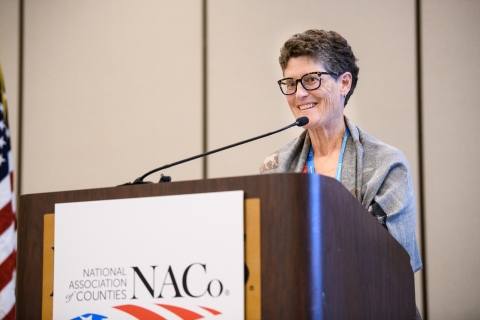Justice committee discusses inmate health care, data-driven decisions
Author
Upcoming Events
Related News

Key Takeaways
Inmate health care and data-driven decision making at the Justice and Public Safety Committee meeting.
Committee Chair Janet Thompson, a Boone County, Mo., commissioner, updated the Justice and Public Safety Committee on the NACo and National Sheriffs’ Association joint task force, which aims to highlight the impact of federal policy on county jail inmate health care and recidivism rates. Currently, the Medicaid Inmate Exclusion Policy denies federal benefits to individuals who are pending disposition or are still presumed innocent.
As a result, county jails are relied upon to serve as treatment centers for individuals with mental illness, substance abuse disorders or other chronic illnesses. Thompson added that most people in county jail system are detainees, not inmates, and have not yet or may not ever be found guilty.
“We have a disparity that’s being created within our justice system because of this federal policy,” she said.
That denial of federal health benefits leads to higher recidivism rates because released detainees are not getting the treatment they need, according to Thompson.
Counties are now paying to fill the gap for individuals who are detained and awaiting trial, she said, adding that the full cost of the current federal policy has shifted to the local level.
“We understand the problems because we’re living with them and I think we can help find and craft the solutions,” Thompson said.
She said she hopes the task force’s efforts will result in membership-driven recommendations, collected stories and supporting data to demonstrate the impact of current policy and the need for action.
“That will contribute to better health, better justice and better public safety outcomes for our communities,” she said.
The discussion also involved data-driven decision making and ways to engage local prosecutors to achieve successful justice outcomes.
Frank Russo, director of government and legislative affairs at the National District Attorneys Association (NDAA), explained how value-improved data has taken form in federal legislation with the First Step Act, which cut mandatory minimum sentences.
“We [the NDAA] were behind that because we saw the value in showing data from the changes that were made by Legislature,” Russo said.
He said prosecutors are embracing data-driven decision making. The San Francisco district attorney’s office has launched an effort to focus on racial bias within sentencing and has placed data online that is now available to the public.
“That is a radical change I think in a good way for our members to show that we are being transparent. We want to be transparent for both our communities and our criminal justice partners,” he said.
He discussed how criminal justice dashboards “makes common sense” to NDAA members because many areas are still using paper files.
Mecklenburg County, N.C., the largest county in North Carolina, still uses paper files, Russo said and is just beginning to put data online.
“To think that the largest county in one of the largest states in the south is still using paper files explains the breadth of the problem we have and the challenges our department faces,” Russo said.
He said the biggest issue with establishing online dashboards is resourcing, both financially and with personnel.
Another challenge involves applying data for larger urban jurisdictions and rural jurisdictions, as different communities interpret data and apply it to the decision-making process in various ways.
“Each jurisdiction is different. The crimes are different, the ability to prosecute is different, the sheriffs and police officers we work with are different and the human element is different for each prosecutor,” he said.
Russo urged county officials to speak with their state and local prosecutors to discuss criminal justice problems and future of data-driven decisions to see how groups can work together to solve these challenges.

Attachments
Related News

Information-sharing bill could protect court workers
The Countering Threats and Attacks on Our Judges Act could provide more than 30,000 state and local judges with access to security assessments, best practices and a database of threats made against colleagues in the justice field.

California counties fight agricultural crime
Sheriffs' offices and prosecutors in California's central valley make specific efforts to prevent and prosecute crimes against the agricultural community.
Survivor’s story helps empower Ohio county dog wardens
A courageous dog attack survivor helped county dog wardens make their case for more authority to protect residents.
